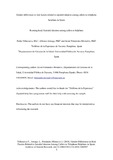Mostrar el registro sencillo del ítem
Gender differences in risk factors related to suicidal ideation among callers to telephone helplines in Spain
| dc.creator | Villanueva Irure, Pedro | es_ES |
| dc.creator | Arteaga Olleta, Alfonso | es_ES |
| dc.creator | Fernández-Montalvo, Javier | es_ES |
| dc.date.accessioned | 2019-06-24T11:13:19Z | |
| dc.date.available | 2019-11-28T00:00:12Z | |
| dc.date.issued | 2018 | |
| dc.identifier.issn | 1381-1118 (Print) | |
| dc.identifier.issn | 1543-6136 (Electronic) | |
| dc.identifier.uri | https://hdl.handle.net/2454/33477 | |
| dc.description | This is an accepted manuscript of an article published by Taylor & Francis in Archives Of Suicide Research on 2018, available online: https://doi.org/10.1080/13811118.2018.1480987. | en |
| dc.description.abstract | The main goals of this study were to determine the prevalence rate of suicidal ideation among callers to a Spanish telephone general crisis helpline (Teléfono de la Esperanza) and to identify gender-based characteristics and risk factors related to suicidal ideation. A sample of 10,765 (6,868 men and 3,897 women) callers to this telephone helpline was assessed. ATENSIS, an assessment tool designed to collect information related to suicidal ideation among callers to telephone helplines, was used. Comparisons between men and women with suicidal ideation were carried out in all variables studied: sociodemographics, telephone call timing, risk factors, and suicidality. Of the total sample, 1.87% (n = 201) presented suicidal ideation, with a higher prevalence in women (2.80%) than in men (1.34%). Moreover, significant gender-based differences among callers with suicidal ideations were observed in some variables: women were older than men and showed a greater prevalence of chronic disease with pain; men showed a greater prevalence of depression, alcohol/drug abuse, helplessness, and lack of hope for the future. This study showed that telephone helplines can be used to identify suicidal ideation among callers. Moreover, gender-based differential characteristics among suicide ideators have been found. The implications for further research are discussed. | en |
| dc.format.extent | 20 p. | |
| dc.format.mimetype | application/pdf | en |
| dc.language.iso | eng | en |
| dc.publisher | Taylor & Francis | en |
| dc.relation.ispartof | Archives of Suicide Research | en |
| dc.rights | © 2018 International Academy for Suicide Research | en |
| dc.subject | Assessment | en |
| dc.subject | Gender | en |
| dc.subject | Risk factors | en |
| dc.subject | Suicidal ideation | en |
| dc.subject | Telephone helplines | en |
| dc.title | Gender differences in risk factors related to suicidal ideation among callers to telephone helplines in Spain | en |
| dc.type | info:eu-repo/semantics/article | en |
| dc.type | Artículo / Artikulua | es |
| dc.contributor.department | Ciencias de la Salud | es_ES |
| dc.contributor.department | Osasun Zientziak | eu |
| dc.rights.accessRights | info:eu-repo/semantics/openAccess | en |
| dc.rights.accessRights | Acceso abierto / Sarbide irekia | es |
| dc.embargo.terms | 2019-11-28 | |
| dc.identifier.doi | 10.1080/13811118.2018.1480987 | |
| dc.relation.publisherversion | https://doi.org/10.1080/13811118.2018.1480987 | |
| dc.type.version | info:eu-repo/semantics/acceptedVersion | en |
| dc.type.version | Versión aceptada / Onetsi den bertsioa | es |


